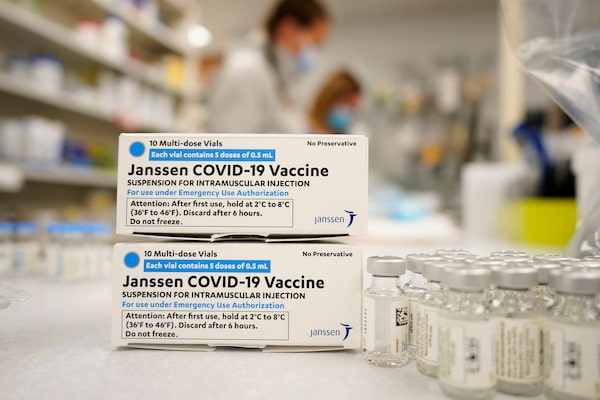
Boxes of Johnson & Johnson COVID-19 vaccines sit in the pharmacy of the National Jewish Hospital for distribution in Denver on March 6, 2021.David Zalubowski/The Associated Press
France will use Johnson & Johnson’s COVID-19 vaccine as planned despite its suspension in the United States, a government spokesman said on Wednesday, adding France had received a first shipment of 200,000 doses.
“The doses, which arrived earlier this week, are being shipped to city general practitioners and to chemists,” government spokesman Gabriel Attal told reporters.
France expects to receive 600,000 doses of the J&J vaccine by the end of the month, according to health ministry data.
After what critics depicted as a slow start, authorities are aiming to speed up France’s vaccination drive with the target of 30 million people having received at leat one dose of a COVID-19 vaccine by mid-June.
U.S. federal health agencies on Tuesday recommended pausing the use of the J&J shot after six women under the age of 50 developed rare blood clots after receiving it, in a fresh setback to efforts to tackle the pandemic. J&J also said it would delay rollout of the vaccine to Europe.
Canada pre-purchased millions of doses of seven different vaccine types, and Health Canada has approved four so far for the various provincial and territorial rollouts. All the drugs are fully effective in preventing serious illness and death, though some may do more than others to stop any symptomatic illness at all (which is where the efficacy rates cited below come in).
- Also known as: Comirnaty
- Approved on: Dec. 9, 2020
- Efficacy rate: 95 per cent with both doses in patients 16 and older, and 100 per cent in 12- to 15-year-olds
- Traits: Must be stored at -70 C, requiring specialized ultracold freezers. It is a new type of mRNA-based vaccine that gives the body a sample of the virus’s DNA to teach immune systems how to fight it. Health Canada has authorized it for use in people as young as 12.
- Also known as: SpikeVax
- Approved on: Dec. 23, 2020
- Efficacy rate: 94 per cent with both doses in patients 18 and older, and 100 per cent in 12- to 17-year-olds
- Traits: Like Pfizer’s vaccine, this one is mRNA-based, but it can be stored at -20 C. It’s approved for use in Canada for ages 12 and up.
- Also known as: Vaxzevria
- Approved on: Feb. 26, 2021
- Efficacy rate: 62 per cent two weeks after the second dose
- Traits: This comes in two versions approved for Canadian use, the kind made in Europe and the same drug made by a different process in India (where it is called Covishield). The National Advisory Committee on Immunization’s latest guidance is that its okay for people 30 and older to get it if they can’t or don’t want to wait for an mRNA vaccine, but to guard against the risk of a rare blood-clotting disorder, all provinces have stopped giving first doses of AstraZeneca.
- Also known as: Janssen
- Approved on: March 5, 2021
- Efficacy rate: 66 per cent two weeks after the single dose
- Traits: Unlike the other vaccines, this one comes in a single injection. NACI says it should be offered to Canadians 30 and older, but Health Canada paused distribution of the drug for now as it investigates inspection concerns at a Maryland facility where the active ingredient was made.
How many vaccine doses do I get?
All vaccines except Johnson & Johnson’s require two doses, though even for double-dose drugs, research suggests the first shots may give fairly strong protection. This has led health agencies to focus on getting first shots to as many people as possible, then delaying boosters by up to four months. To see how many doses your province or territory has administered so far, check our vaccine tracker for the latest numbers.
The halt follows restrictions imposed by many European countries on using an alternative vaccine from AstraZeneca , in response to similar reports of rare blood clotting among a very small number of recipients.
Our Morning Update and Evening Update newsletters are written by Globe editors, giving you a concise summary of the day’s most important headlines. Sign up today.